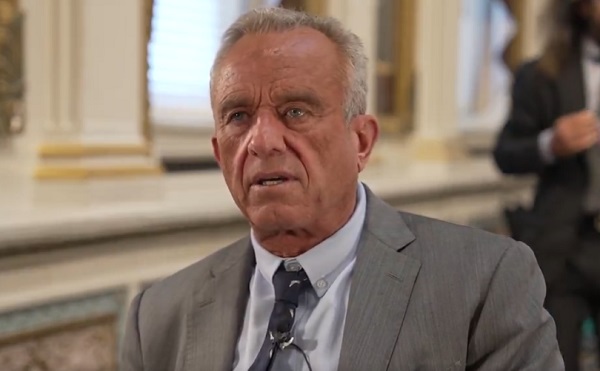Alberta
Why U.S. tariffs on Canadian energy would cause damage on both sides of the border

Marathon Petroleum’s Detroit refinery in the U.S. Midwest, the largest processing area for Canadian crude imports. Photo courtesy Marathon Petroleum
From the Canadian Energy Centre
More than 450,000 kilometres of pipelines link Canada and the U.S. – enough to circle the Earth 11 times
As U.S. imports of Canadian oil barrel through another new all-time high, leaders on both sides of the border are warning of the threat to energy security should the incoming Trump administration apply tariffs on Canadian oil and gas.
“We would hope any future tariffs would exclude these critical feedstocks and refined products,” Chet Thompson, CEO of the American Fuel & Petrochemical Manufacturers (AFPM), told Politico’s E&E News.
AFPM’s members manufacture everything from gasoline to plastic, dominating a sector with nearly 500 operating refineries and petrochemical plants across the United States.
“American refiners depend on crude oil from Canada and Mexico to produce the affordable, reliable fuels consumers count on every day,” Thompson said.
The United States is now the world’s largest oil producer, but continues to require substantial imports – to the tune of more than six million barrels per day this January, according to the U.S. Energy Information Administration (EIA).
Nearly 70 per cent of that oil came from Canada.
Many U.S. refineries are set up to process “heavy” crude like what comes from Canada and not “light” crude like what basins in the United States produce.
“New tariffs on [Canadian] crude oil, natural gas, refined products, or critical input materials that cannot be sourced domestically…would directly undermine energy affordability and availability for consumers,” the American Petroleum Institute, the industry’s largest trade association, wrote in a recent letter to the United States Trade Representative.
More than 450,000 kilometres of oil and gas pipelines link Canada and the United States – enough to circle the Earth 11 times.
The scale of this vast, interconnected energy system does not exist anywhere else. It’s “a powerful card to play” in increasingly unstable times, researchers with S&P Global said last year.
Twenty-five years from now, the United States will import virtually exactly the same amount of oil as it does today (7.0 million barrels per day in 2050 compared to 6.98 million barrels per day in 2023), according to the EIA’s latest outlook.
“We are interdependent on energy. Americans cutting off Canadian energy would be like cutting off their own arm,” said Heather Exner-Pirot, a special advisor to the Business Council of Canada.
Trump’s threat to apply a 25 per cent tariff on imports from Canada, including energy, would likely “result in lower production in Canada and higher gasoline and energy costs to American consumers while threatening North American energy security,” Canadian Association of Petroleum Producers CEO Lisa Baiton said in a statement.
“We must do everything in our power to protect and preserve this energy partnership.”
Energy products are Canada’s single largest export to the United States, accounting for about a third of total Canadian exports to the U.S., energy analysts Rory Johnston and Joe Calnan noted in a November report for the Canadian Global Affairs Institute.
The impact of applying tariffs to Canadian oil would likely be spread across Canada and the United States, they wrote: higher pump prices for U.S. consumers, weaker business for U.S. refiners and reduced returns for Canadian producers.
“It is vitally important for Canada to underline that it is not just another trade partner, but rather an indispensable part of the economic and security apparatus of the United States,” Johnston and Calnan wrote.
2025 Federal Election
Next federal government should recognize Alberta’s important role in the federation

From the Fraser Institute
By Tegan Hill
With the tariff war continuing and the federal election underway, Canadians should understand what the last federal government seemingly did not—a strong Alberta makes for a stronger Canada.
And yet, current federal policies disproportionately and negatively impact the province. The list includes Bill C-69 (which imposes complex, uncertain and onerous review requirements on major energy projects), Bill C-48 (which bans large oil tankers off British Columbia’s northern coast and limits access to Asian markets), an arbitrary cap on oil and gas emissions, numerous other “net-zero” targets, and so on.
Meanwhile, Albertans contribute significantly more to federal revenues and national programs than they receive back in spending on transfers and programs including the Canada Pension Plan (CPP) because Alberta has relatively high rates of employment, higher average incomes and a younger population.
For instance, since 1976 Alberta’s employment rate (the number of employed people as a share of the population 15 years of age and over) has averaged 67.4 per cent compared to 59.7 per cent in the rest of Canada, and annual market income (including employment and investment income) has exceeded that in the other provinces by $10,918 (on average).
As a result, Alberta’s total net contribution to federal finances (total federal taxes and payments paid by Albertans minus federal money spent or transferred to Albertans) was $244.6 billion from 2007 to 2022—more than five times as much as the net contribution from British Columbians or Ontarians. That’s a massive outsized contribution given Alberta’s population, which is smaller than B.C. and much smaller than Ontario.
Albertans’ net contribution to the CPP is particularly significant. From 1981 to 2022, Alberta workers contributed 14.4 per cent (on average) of total CPP payments paid to retirees in Canada while retirees in the province received only 10.0 per cent of the payments. Albertans made a cumulative net contribution to the CPP (the difference between total CPP contributions made by Albertans and CPP benefits paid to retirees in Alberta) of $53.6 billion over the period—approximately six times greater than the net contribution of B.C., the only other net contributing province to the CPP. Indeed, only two of the nine provinces that participate in the CPP contribute more in payroll taxes to the program than their residents receive back in benefits.
So what would happen if Alberta withdrew from the CPP?
For starters, the basic CPP contribution rate of 9.9 per cent (typically deducted from our paycheques) for Canadians outside Alberta (excluding Quebec) would have to increase for the program to remain sustainable. For a new standalone plan in Alberta, the rate would likely be lower, with estimates ranging from 5.85 per cent to 8.2 per cent. In other words, based on these estimates, if Alberta withdrew from the CPP, Alberta workers could receive the same retirement benefits but at a lower cost (i.e. lower payroll tax) than other Canadians while the payroll tax would have to increase for the rest of the country while the benefits remained the same.
Finally, despite any claims to the contrary, according to Statistics Canada, Alberta’s demographic advantage, which fuels its outsized contribution to the CPP, will only widen in the years ahead. Alberta will likely maintain relatively high employment rates and continue to welcome workers from across Canada and around the world. And considering Alberta recorded the highest average inflation-adjusted economic growth in Canada since 1981, with Albertans’ inflation-adjusted market income exceeding the average of the other provinces every year since 1971, Albertans will likely continue to pay an outsized portion for the CPP. Of course, the idea for Alberta to withdraw from the CPP and create its own provincial plan isn’t new. In 2001, several notable public figures, including Stephen Harper, wrote the famous Alberta “firewall” letter suggesting the province should take control of its future after being marginalized by the federal government.
The next federal government—whoever that may be—should understand Alberta’s crucial role in the federation. For a stronger Canada, especially during uncertain times, Ottawa should support a strong Alberta including its energy industry.
Alberta
Province announces plans for nine new ‘urgent care centres’ – redirecting 200,000 hospital visits

Expanding urgent care across Alberta
If passed, Budget 2025 includes $17 million in planning funds to support the development of urgent care facilities across the province.
As Alberta’s population grows, so does the demand for health care. In response, the government is making significant investments to ensure every Albertan has access to high-quality care close to home. Currently, more than 35 per cent of emergency department visits are for non-life-threatening conditions that could be treated at urgent care centres. By expanding these centres, Alberta’s government is enhancing the health care system and improving access to timely care.
If passed, Budget 2025 includes $15 million to support plans for eight new urgent care centres and an additional $2 million in planning funds for an integrated primary and urgent care facility in Airdrie. These investments will help redirect up to 200,000 lower-acuity emergency department visits annually, freeing up capacity for life-threatening cases, reducing wait times and improving access to care for Albertans.
“More people are choosing to call Alberta home, which is why we are taking action to build capacity across the health care system. Urgent care centres help bridge the gap between primary care and emergency departments, providing timely care for non-life-threatening conditions.”
“Our team at Infrastructure is fully committed to leading the important task of planning these eight new urgent care facilities across the province. Investments into facilities like these help strengthen our communities by alleviating strains on emergency departments and enhance access to care. I am looking forward to the important work ahead.”
The locations for the eight new urgent care centres were selected based on current and projected increases in demand for lower-acuity care at emergency departments. The new facilities will be in west Edmonton, south Edmonton, Westview (Stony Plain/Spruce Grove), east Calgary, Lethbridge, Medicine Hat, Cold Lake and Fort McMurray.
“Too many Albertans, especially those living in rural communities, are travelling significant distances to receive care. Advancing plans for new urgent care centres will build capacity across the health care system.”
“Additional urgent care centres across Alberta will give Albertans more options for accessing the right level of care when it’s needed. This is a necessary and substantial investment that will eventually ease some of the pressures on our emergency departments.”
The remaining $2 million will support planning for One Health Airdrie’s integrated primary and urgent care facility. The operating model, approved last fall, will see One Health Airdrie as the primary care operator, while urgent care services will be publicly funded and operated by a provider selected through a competitive process.
“Our new Airdrie facility, offering integrated primary and urgent care, will provide same-day access to approximately 30,000 primary care patients and increase urgent care capacity by around 200 per cent, benefiting the entire community and surrounding areas. We are very excited.”
Alberta’s government will continue to make smart, strategic investments in health facilities to support the delivery of publicly funded health programs and services to ensure Albertans have access to the care they need, when and where they need it.
Budget 2025 is meeting the challenge faced by Alberta with continued investments in education and health, lower taxes for families and a focus on the economy.
Quick facts
- The $2 million in planning funds for One Health Airdrie are part of a total $24-million investment to advance planning on several health capital initiatives across the province through Budget 2025.
- Alberta’s population is growing, and visits to emergency departments are projected to increase by 27 per cent by 2038.
- Last year, Alberta’s government provided $8.4 million for renovations to the existing Airdrie Community Health Centre.
Related information
-

 Business2 days ago
Business2 days agoLabor Department cancels “America Last” spending spree spanning five continents
-

 Health2 days ago
Health2 days agoRFK Jr. says ‘everything is going to change’ with CDC vaccine policy in Michael Knowles interview
-

 Addictions2 days ago
Addictions2 days agoThere’s No Such Thing as a “Safer Supply” of Drugs
-

 Economy1 day ago
Economy1 day agoClearing the Path: Why Canada Needs Energy Corridors to Compete
-

 2025 Federal Election2 days ago
2025 Federal Election2 days agoNext federal government should recognize Alberta’s important role in the federation
-

 2025 Federal Election12 hours ago
2025 Federal Election12 hours ago2025 Federal Election Interference from China! Carney Pressed to Remove Liberal MP Over CCP Bounty Remark
-

 Uncategorized11 hours ago
Uncategorized11 hours agoPoilievre on 2025 Election Interference – Carney sill hasn’t fired Liberal MP in Chinese election interference scandal
-

 2025 Federal Election2 days ago
2025 Federal Election2 days agoCanadian Banks Tied to Chinese Fentanyl Laundering Risk U.S. Treasury Sanctions After Cartel Terror Designation









